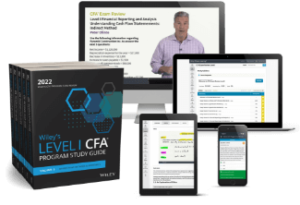Is the CFA Worth It?
Most professionals pursue the CFA charter to advance their careers, earn more money, and establish credibility. But will it deliver? To determine whether the CFA is worth the time, money, and energy investment, let’s review the pros and cons of the CFA designation as well as consider your personal goals.

Is the CFA Worth It Quick Facts
- The CFA charter has the potential to lead to better career prospects, increased salary, instant credibility, and increased marketability as a job candidate.
- CFA candidates increase their salary by an average of 53% after passing the Level III exam.
- It takes an average of four years to pass the CFA exam, and each exam level calls for over 300 hours of study time.
- Promising jobs for CFA charterholders include portfolio management, equity research, investment strategy, financial consulting, and risk management.
Is a CFA Worth It: The Pros
Better Career Prospects
Being a CFA charterholder makes you stand out in the corporate finance industry. It also gives you sought-after financial management skills and access to a network of other CFA charterholders. All of these benefits lead to better career prospects.
In a competitive hiring market, candidates with connections and demonstrated expertise in investment management and financial analysis naturally rise to the top. Make your journey to getting the CFA easier by enlisting the help of Wiley CFA.
Add Credibility to Your Resume
Having the CFA designation listed on your resume and LinkedIn page gives you instant credibility in the finance world. According to Robert Half, it’s the “gold standard” of Wall Street qualifications. Not only does the CFA charter certify your skills and knowledge related to investing and finance, but it’s also a testament to your work ethic and commitment.
It’s no small feat to complete 1,000 hours of studying and pass three notoriously difficult four-and-a-half-hour exams. And that may sound intimidating, but with the help of Wiley CFA Review Courses, you can take the guesswork out of exam prep and benefit from having support along the entire journey.
The Title CFA Can Be Useful Particularly in the Investment Industry
If you’re looking to break into the investment industry, it’s good to be aware that being a Chartered Financial Analyst is quickly becoming a preferred credential, especially for senior leadership. Most CFA charterholders go into portfolio management or research, which rely heavily on investment management knowledge. In most developed countries, on the asset management (“buy”) side, the CFA has been “required” for some time now. On the “sell” side less so, but more than in the past. And even in developing countries, the credential is moving from the “nice to have” category to required as well.
A CFA Can Improve Your Salary
Professionals who signed up to take the CFA exam saw an average salary increase of 53% after passing the Level III exam, according to research conducted by 300Hours. And on top of that, CFA candidates experience pay increases after passing each subsequent level, earning an average of 29% more after they pass Level I of the CFA exam and 34% more after passing the Level II exam. So, if you were wondering, “Is CFA Level 1 worth it?” It certainly is. This is all compelling data that suggests the CFA designation can increase your salary.
CFA Institute acknowledges that salaries for CFA charterholders can vary widely based on role and experience, but they conducted a compensation survey in 2019 and found CFA® charterholders working as portfolio managers made a base salary of $126,000 and total compensation of $177,000. Payscale.com currently reports that CFA charterholders earn an average salary of $80,903, with salaries increasing to $143,000 after gaining 10 years of experience.
Start the journey to increasing your salary potential today by studying with Wiley CFA.
A CFA Can Set You Apart From Others in Finance
If you’ve got your eye on a promotion or a new job opportunity, having the CFA designation can instantly set you apart from the competition. Not everyone has achieved CFA status, so being someone with verified skills in investing, asset valuation, portfolio management, and wealth planning will instantly make you stand out. Moreover, it gives you mobility; think of it as the Institute effectively stamping a “work visa” on your passport to work in other countries.
Is a CFA Worth It: The Cons
Getting CFA Certified Takes Time
The average CFA candidate takes four years to pass the CFA exam. And on top of that, you’ll need four years of relevant work experience to earn the designation, so it takes a lot of time to get certified.
The main time commitment for the exam is study time. Each exam level takes over 300 hours to prepare for. However, it takes less time to prepare with Wiley CFA Review Courses because your study time is maximized with an Adaptive Review feature that has you spend less time on concepts you’ve mastered and more time on concepts you need more help with.
Becoming a CFA Can Cost a Lot of Money
Your minimum investment to take the CFA exam is around $2,500—and that is the best-case scenario where you register early for each of your three exams and pass on the first attempt. However, costs can add up quickly if you fail an exam and have to pay to retake it. And with a low average pass rate, most candidates will have to retake an exam. Using a Wiley CFA Prep Course helps you pass the exam the first time, and it’s worth the investment if you commit and follow through.
The CFA Pass Rates Are Low
The CFA exam average pass rate is 44%, so even if you do decide to invest the time and money into the exam, there is no guarantee you’ll pass. However, as long as you don’t underestimate the Level I exam, commit to a consistent study plan with over 300 hours of study time, and prep with a Wiley CFA Review Course, you greatly increase your chances of passing.
Get started with Wiley CFA Study Materials.
An Improved Career Isn’t Guaranteed With a CFA
The CFA charter won’t magically improve your career—you still have to work hard, apply your knowledge, and pursue a relevant career path. But, when you study for the CFA exam with Wiley, you learn concepts that help you pass the exam and serve you in your career. The CFA title is not necessarily what’s valuable, but the education and the skills you learn–that’s what gets you the better salary.
An Improved Salary Isn’t Guaranteed With a CFA
When you get CFA certified, getting a salary bump will depend on your position and employer, so there is no guarantee you’ll get a raise just for earning your charter. But if you’re in the investment industry or plan to transfer to an investment firm, it’s likely your CFA designation will garner you more money. So, if your current employer doesn’t see the value in your CFA, don’t worry, someone will.
Is the CFA Worth It for You?
What Are Your Career Goals? Will a CFA Help You Achieve Them?
Is getting a CFA worth it if you want to work in accounting and auditing? Probably not—the CPA is probably more valuable for that career trajectory. Is CFA worth it for investment banking? Yes, that’s more likely. If you want to work in portfolio management, equity research, investment strategy, financial consulting, risk management, research analysis, or in the buy-side sector, the CFA can help you achieve your career goals.
Another thing to consider is whether you’ll work with industries or positions that will respect your knowledge. A high yield credit trader quoted by efinancialcareers.com noted, “[The CFA] hasn’t really helped with my job, but people on the buy-side respect me because of it… Being a CFA charterholder does help a lot in conversations with my buy-side clients. They see the CFA stamp on my business card and I think it brings me more respect. For this reason, I’d say it’s worthwhile.”
Where Are You Currently at in Your Work and Life?
The CFA designation seems to be most beneficial at the beginning and middle of a career in finance. So, if you have 0-5 years of experience, it’s prime time to pursue certification. Gaining experience and proving your knowledge with the CFA certification can fast-track your career growth. Or if you’re further along in your career but want to make the switch to a financial management career, it still might be a good time to earn this prestigious designation.
Are You Looking to Switch Careers? Will the CFA Help?
If you’re looking to get your foot in the door in the finance industry, getting the CFA is likely the right move. But the specific position and career trajectory you’re interested in will really determine its value.
CFA Institute has identified typical finance jobs held by charterholders to include:
- Portfolio management
- Risk analysis and risk management
- Investment strategy
- Relationship management and wealth management
- Data science
- Credit analysis
- Chief investment office
- Trading
- Accounting and auditing
- Financial planning
And typical investment management sector jobs for CFAs include:
- Asset management
- Private wealth management
- Commercial banking
- Investment banking
- Insurance
However, just earning the designation won’t enable your career switch. You’ll have to couple it with networking and getting yourself out there.
One risk manager who was hoping to get into asset management was quoted by efinancialcareers.com saying, “Having the CFA Charter is definitely an advantage: it adds credibility and is a signal of competence. However, I was hoping to use the charter to move into asset management and so far that hasn’t worked out. I feel like that Charter will only enable this move if I combine it with heavy networking and intense job hunting, which is hard when I’m holding down a full-time job.”
Given the Above, What Other Option(s) Should You Consider?
If you are still hesitant about whether the CFA is the right certification for you, perhaps you should consider the CPA, CMA, or an MBA program. CPAs work mostly in auditing and attestation and CMAs work in management accounting. Learn about what a CMA is and how it compares to the CPA and CFA in our article What Is a CMA?
The Bottom Line: Becoming a CFA Can Absolutely Be Worth It
Is a CFA Worth It – Frequently Asked Questions (FAQs)
Here are some answers to frequently asked questions about whether the CFA is worth it.
- Yes. The CFA is the “gold standard” of Wall Street qualifications and can help corporate finance professionals advance their careers, earn more money, and establish credibility.
- According to CFA Institute, CFA® charterholders working as portfolio managers make a total compensation of $177,000 (base salary of $126,000). Payscale.com currently reports that CFAs earn an average salary of $80,903, with salaries increasing to $143,000 after gaining 10 years of experience.
- The value of the CFA vs. CPA depends on your career goals. The CFA is better for professionals who work in asset management and trading, and the CPA is better for professionals who work in auditing and attestation.
- The CFA increases your credibility and marketability as a corporate finance professional, but it will need to be coupled with job-searching and networking to get you a job.
- The CFA charter can help advance your career in investment banking. In fact, investment banking is a typical job held by CFA charterholders.
- Yes. The CFA exam is notoriously difficult, but Wiley CFA self-study materials make it manageable to learn the material, pass the exam, and advance your career and increase your earning potential.
Related Articles
We use cookies to learn how you use our website and to ensure that you have the best possible experience.
By continuing to use our website, you are accepting the use of cookies.
Learn More




